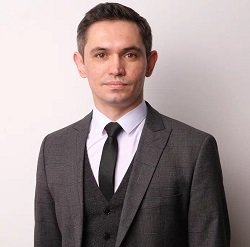‘Thousands of franchises will make it soon’: Tatarstan businesses occupy niches of gone brands

Amid Western sanctions, tough economic conditions and the absence of clear legislation in the purchase of franchises, Russian businesses didn’t take risks in this area last year — the decline in the segment was about 20-30%. Nevertheless, the exit of Western players cleared the battlefield for Russian entrepreneurs. According to experts, Tatarstan businesspeople who increased the footprint of their brands not only in the republic or Russia but also abroad have had an active stance here. Read more in Realnoe Vremya’s report.
The franchise market in Russia is raw enough
The events in 2022 allowed the franchise market in Russia to consolidate. As analysts note, weak players who ran their businesses without any strategy are gone, and those who think more profoundly are left.
Russian franchises conserved their positions but slowed down the expansion. Nevertheless, this segment of the market didn’t carry many losses, thinks head of the Committee for Franchise Development and Business Automation of the Tatarstan Chamber of Industry and Commerce Lenar Murtazin. However, he says the franchise market in Russia is raw enough:
“We don’t even have a law on franchise, though in neighbouring Kazakhstan it has been in force since the mid-2000s. The concept of the franchise itself is absent in our legislation. This activity is regulated only by norms of the Civil Code and the Provision of Commercial Concession. The activity of all franchises and their packers is regulated by Trademark Law. Meanwhile, a trademark is just a hundredth part of the whole franchise,” Murtazin complained about the flaw of the Russian lawmaker.

The start of the special operation and then announced partial mobilisation seriously shattered the franchise market in Russia. Owners of big chains suspended their operations during the coronavirus pandemic first and then last spring and autumn.

When personal ambitions and desire to develop your brand win over
Tatarstan businesspeople have become active generators of ideas and franchise sellers in the last few years. Vending cafes operating in the “takeaway coffee” format have demonstrated significant growth in this segment. Hohoro self-service coffee chain’s franchise appeared in the market of Kazan in 2019, then it spread across the republic. Now its owners Ilnar Shamsutdinov and Edvart Ziyazetdinov from Kazan expanded the chain of coffee shops to 3,000 in Russian regions and entered markets of CIS countries.
Another two Tatarstan entrepreneurs Kirill Popov and Arslan Gabidullin decided to develop the franchise of their brand created during the fight against coronavirus. Lifehaсker Coffee self-service coffee shops have become an international chain with 5,000 shops in two years.

Another Tatarstan franchise grows actively too — Tsekh restaurant chain with an admission fee where clients pay for food and beverages for their prime cost. The idea of creating a food outlet in such a format as well as the company itself belongs to Rinat Sadrislamov from Kazan. He opened the first restaurant in the Tatarstan capital in 2018 and today he has sold 12 franchises: Tsekh operated in a number of cities in Krasnodar Krai, Ulyanovsk, Ufa and Yekaterinburg.
Rimma Nurutdinova’s Kazan clothing repair studio Knitka develops a franchise chain too. The franchise of Profi Centre making paints and varnishes became topical against the backdrop of import substitution. Its StoProTec stores are opening in Grozny, and Makhachkala is next in line. After opening the first florist’s named Tsvety Mix in Kazan 10 years ago, its owners, the spouses Artyom and Zarina Lisikhinys sell their franchise in other cities too.
At the same time, the entrepreneurs who started dealing with franchises in their business are mainly focused on Kazan. There are several reasons, Lenar Murtazin explains:
“The youth from other districts of the republic come here to study. After receiving their diploma, they either stay here or move to Moscow. The most ambitious and motivated businesspeople from other Tatarstan cities also try to develop their businesses in the capital of the republic. The status of the city is another circumstance: a businessperson will unlikely trust a franchise from, for instance, Almetyevsk. Few people know about it, while the status of Kazan has another meaning.”
Franchise as rapid business growth instrument
Last year’s events changed tendencies in Russia’s franchise market. If the quite capital-intensive franchises were in demand earlier — from 30 to 50 million rubles, now, the expert notes, Russians are ready to invest 15-20 times less. Given dramatic changes and the unsteady economy, the influence of sanctions and uncertainty, Russian entrepreneurs who decided to become franchisees try not to invest huge money fearing risk. While they don’t mind losing 1.5-2 million rubles of investments in case of force majeure, the interlocutor of the newspaper explains the new trend.
Also, last year became a period of the mass exit of Western and European franchise brands, which opened the niche for Russian businesses. About 400 renowned brands have left the Russian market in the last year, some 1,100 are restructuring their businesses or looking for buyers, and about 1,200 foreign businesses at the moment stay in the Russian market.
“First the announcement of the special military operation, then sales ‘stopped’ in autumn, and franchisers were tired of waiting for the sea weather. Their management companies, sales, and commercial campaigns went to CIS countries, mostly Kazakhstan. And they actively sell their franchises there,” says Murtazin.

If last year Russian businesses announced their intentions to buy and rebrand famous companies like IKEA, but now there is no demand for them, thinks the head of the Committee for Franchise Development. The exit of foreign businesses, and financial losses of Russian franchisees detected a weak sport in Russian legislation, more precisely, the absence of a legal basis that would allow addressing foreign owners claims:
“Everybody survived as they could. And it is rather a disadvantage than an advantage. Businesses understand that if they buy a European or American franchise, they will say in a month: ‘That’s it, we don’t back you.’ In the end, entrepreneurs are alone with their problems,” the expert explains businesspeople’s fears.
At the same time, a positive trend is plain to see — Russian franchises start to occupy vacant niches after Western players. Russian enterprises started to create their franchise packages. It is clothing repair studios, showrooms, companies offering educational or hairdressing services, mini-factories making medical goods, firms selling equipment.
“I think franchises will boom in Russia this year. The market is free — weak players, and foreign brands are gone. Russians are looking for something new to replace them, and traffic hasn’t disappeared anywhere. Considering that expansion thanks to franchises is one of the instruments for a business’s fast growth, hundreds of new franchises precisely from the Russian entrepreneur community can appear and make it. A bet can be made in this area on services for children — kindergartens, additional education; food outlets, of course — some conceptual establishments, and thirdly IT solutions: online delivery platforms, different services and so on,” Lenar Murtazin concluded.